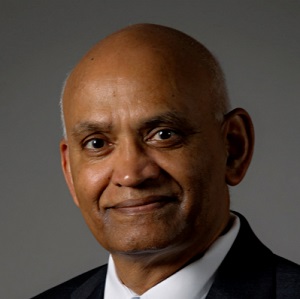Professor Krishna Pattipati
 The University of Connecticut (UConn) Board of Trustees Distinguished Professor in the Department of Electrical and Computer Engineering, Krishna Pattipati is advancing the field of Systems Engineering as a research faculty member at UConn’s United Technologies Corporation Institute for Advanced Systems Engineering (UTC-IASE). Through his research, Dr. Pattipati applies systems theory optimization and probabilistic inference to industry and defense.
The University of Connecticut (UConn) Board of Trustees Distinguished Professor in the Department of Electrical and Computer Engineering, Krishna Pattipati is advancing the field of Systems Engineering as a research faculty member at UConn’s United Technologies Corporation Institute for Advanced Systems Engineering (UTC-IASE). Through his research, Dr. Pattipati applies systems theory optimization and probabilistic inference to industry and defense.
He recently received a grant of $1.5 million from the Department of Defense to create Decision Support tools that will incorporate artificial intelligence, behavioral science, and meteorological information to maintain and modernize the scheduling and upkeep of ships for the United States Navy. Read more here.
Dr. Pattipati’ s approach to research begins with the real-world application of his work. By observing and researching the problem he needs to solve, he creates algorithms and mathematical representations for the system.
“Good applications lead to good theory,” is a research philosophy evident in Dr. Pattipati’ s work.
His experience with Systems Engineering began during his time as an undergraduate at the Indian Institute of Technology, Kharagpur, where he learned about the range of fields that systems engineering and analysis can be applied. This helped develop his ability to abstractly look at all kinds of systems and address their problems in unified ways. He went on to pursue his Master’s in Electrical Engineering and received his Ph.D. in Control and Communication Systems at the University of Connecticut in 1980. Here, he began his research working with Professor David Kleinman, which exposed him to new problems in systems theory and optimization.
The United States Navy regularly deal with complex and unmanned systems. They provided funding to Dr. Pattipati and Dr. Kleinman to apply systems engineering models to their unmanned systems, which allowed them to develop strategies for monitoring, control, planning and organizational structures. Dr. Pattipati also worked on systems health management, which dealt with diagnosing and troubleshooting problems in complex systems. He was able to combine concepts from graph theory, artificial intelligence, information theory and optimization, which culminated in seven Best Paper Awards, as well as research funding from NASA, National Science Foundation, Sikorsky Aircraft, Harris Corporation and Pratt & Whitney. His work on system health management improves the competitiveness of American industries by reducing system life cycle costs, makes system operations efficient, and enhances equipment availability and customer satisfaction. His work has seen a number of applications at NASA (e.g., Space station, Ares-1X, Space launch system, the upcoming Artemis), semi-conductor fabrication facilities (where downtime incurs significant economic cost), medical equipment (where patient safety and equipment availability are paramount), and autonomous helicopter actuator prognostics, to name a few.
Dr. Pattipati has been a part of the UTC-IASE since its inception and worked with UTC to secure funding for the center, as the UTC-IASE’s founding director. This involved developing courses and curriculum, encouraging faculty members to teach the new courses, and teaching courses himself. At UConn he appreciates the collaboration and multidisciplinary projects he gets to work on with his colleagues and students. “The people are very friendly and collegial, and our systems group collaborates on joint projects all the time.” Being a UConn faculty member gives him the freedom to investigate many different types of systems and explore research topics related to his wide range of interests.
Dr. Pattipati holds a Ph.D. Electrical Engineering in Control and Communication Systems from the University of Connecticut. His lab members research proactive decision support, uncertainty quantification, smart manufacturing, autonomy, knowledge representation, and optimization-based learning and inference. He has published over 500 articles (Google Scholar). He is a cofounder of Qualtech Systems, Inc., a firm specializing in advanced integrated diagnostics software tools (TEAMS, TEAMS-RT, TEAMS-RDS, TEAMATE), and serves on the board of Aptima, Inc. Dr. Pattipati was selected by the IEEE Systems, Man, and Cybernetics (SMC) Society as the Outstanding Young Engineer of 1984, and received the Centennial Key to the Future award. He has served as the Editor-in-Chief of the IEEE TRANSACTIONS ON SYSTEMS, MAN, AND CYBERNETICS–PART B from 1998 to 2001. He was co-recipient of the Andrew P. Sage Award for the Best SMC Transactions Paper for 1999, the Barry Carlton Award for the Best AES Transactions Paper for 2000, the 2002 and 2008 NASA Space Act Awards for “A Comprehensive Toolset for Model-based Health Monitoring and Diagnosis,” and “Real-time Update of Fault-Test Dependencies of Dynamic Systems: A Comprehensive Toolset for Model-Based Health Monitoring and Diagnostics”, and the 2003 AAUP Research Excellence Award at UCONN. He is an elected Fellow of IEEE and of the Connecticut Academy of Science and Engineering.